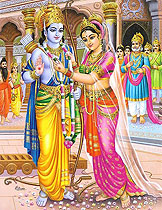The final volume of Shri Ramcharitramanas, Uttar Kaand, provides definite guidelines for a utopian or ideal life. It can be described as a recipe for successful living. It outlines the stairway to idealism. Among the various strategies expressed in this ‘kaand’ are seven questions with their answers, all for the purification of our lives.
Q1. What is the most difficult form to acquire?
A. The human form, after much sacrifice and austerities is the form that all beings desire. It is only by one’s great good fortune that this human body can be secured. It is the gateway of salvation. As such, one should use it to carry out the highest pursuits of spiritual endeavours that will lead to the God-ward goal.
Q2. What is the greatest pain?
A. There is no misery in the world as terrible as poverty. Poverty, in this case refers not only to material indigence, but a lack of all other virtues, values and positive qualities. An individual bereft of austerities, compassion, self-control, discriminative knowledge and spiritual fortitude lives in an impoverished state and experiences much pain. On the other hand, however, spiritual wealth is the affluence that each individual should strive to attain.
Q3. What is the highest pleasure?
A. Communion with elevated beings or saints is the highest form of pleasure. Their company is uplifting; their presence heals the environment and their words, actions or even a mere glance from them is of great therapeutic value. It is said that heat flows from an object of high intensity to low. In the ‘satsang’ or company of an elevated being such as one’s Guru, one experiences unspeakable bliss and peace. Indeed, no worldly pleasure can surpass this unique form of pleasure.
Q4. What are the characteristics of both good and evil?
A. To be charitable to others in thought, word and deed, to be compassionate, to seek the welfare of others, to live selflessly, devoid of prejudices and egoism are the disposition of the good. Good people endure pain in the interest of others whereas the evil or those prone to wicked deeds subject others to pain. The presence of the positive or righteous ones is conducive to universal joy while the negative or evil ones cause calamity wherever they set foot.
Q5. What is the highest religious merit?
A. Inflicting no harm on others and practising non- aggression and non- arrogance are actions that gain for us the highest religious merit. One of the tenets of Hinduism is ‘ Ahimsa Parmo Dharma’- Non-violence is one of our greatest duties. It is for this reason that a vegetarian lifestyle is recommended.
Q6. What is the most deadly sin?
A. There is no sin as heinous as ill-speaking others. Hinduism places much value on speech and advises that one’s words ought to be truthful, wholesome, and a teaching tool wherever necessary. The tongue should never be used to vilify, ill-speak or revile others in any form.
Q7. What are the diseases of the mind?
A. Ignorance is the root of all ailments from which other diseases arise. The combination of lust, greed and anger results in a state of miserable paralysis. Cravings of various kinds lead to attachment, jealousy, egoism, pride, deceit and a host of other malignant qualities that afflict one’s mental state. The remedy for these diseases is devotion and unconditional surrender to the feet of the Lord. A mind full of faith is the vehicle in which the medicine should be administered. It is only then that the diseases will be healed.
As we come to the end of yet another year in our lives, what better time than now is it to reflect on these questions and resolve to start anew to walk closer on the path to Divinity!



